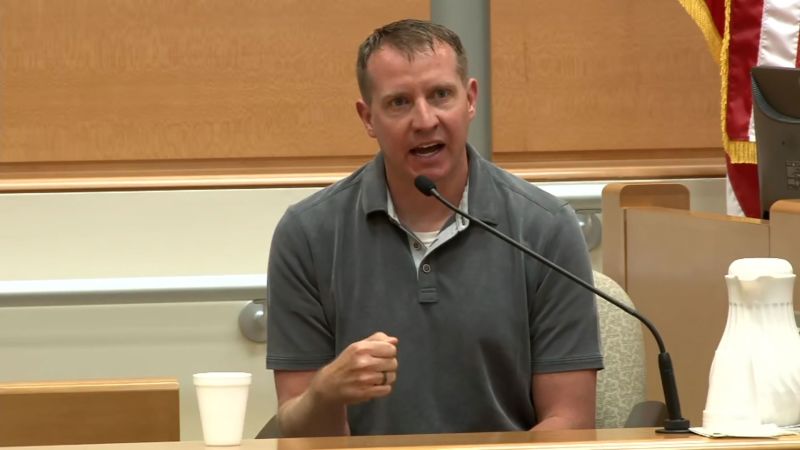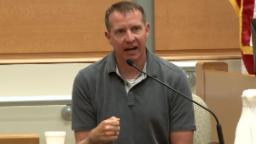

CNN
—
In emotional testimony on Thursday, Robbie Parker, the parent of a Sandy Hook shooting victim, recounted the violent threats and harassment he and his family have suffered in the years since conspiracy theorist Alex Jones called him a crisis actor.
The day after their six-year-old daughter, Emilie, was murdered in the 2012 shooting, Parker gave a statement to the press. Hours later, Jones was on his InfoWars show describing him as a crisis actor to his audience of millions. (Jones acknowledged that he spoke about Parker by name when he testified earlier during the trial, which is to determine how much he must pay to families of Sandy Hook shooting victims for his lies about the massacre.)
Later that night, unable to sleep, Parker said he saw the start of a deluge of hateful messages about the press conference on the Facebook memorial page for Emilie. Parker said he removed Emilie’s Facebook memorial page weeks after the shooting because the harassment was too much to control.
“I felt like I couldn’t protect Emilie’s name, or her memory anymore so I had to get rid of it,” Parker said through tears.
As days passed and the harassment increased, Parker’s family grew paranoid. They questioned what of Emilie’s life to share with guests during the wake and funeral services. Ultimately, they chose to have a closed casket wake out of concern someone would try to take photos of Emilie’s body or her things, Parker testified.
“I was paranoid and he was paranoid. Like we just shut down. We were just zombies. I don’t even hardly remember what was said on the day of the funeral,” Alissa Parker said during testimony before her husband. “They stole that from me.”
Robbie Parker, who has in many ways been the face of Jones’ hoax narrative about the shooting, said he reported the harassment and threats to law enforcement and social media attacks to Facebook and YouTube. “I was like pleading and pleading for their help,” he said. But that didn’t work either, he testified.
For years, he tried to ignore it, choosing not to engage with the people threatening his family and calling him an actor. “I’d been taught that like, you don’t engage with a bully,” he said. “If somebody’s bullying you, you ignore them and eventually they get tired and they leave you alone. And that had worked for me in my life.”
The family moved to Washington state in early 2014. Within months of moving, however, Robbie Parker realized the “hoaxers” had found them. He said he saw a YouTube video detailing the sale of their new home and address.
“And so immediately that sense of security that I thought that we had was totally shattered,” he said. “They would come in these waves and it was almost like I knew when Alex Jones said something because we would get a huge wave of stuff.”
Through tears, he recalled a man confronting him on the street in Seattle in the fall of 2016, nearly four years after the shooting. Yelling and cursing at him, the man asked him how he could sleep at night and how much he was paid by the government for acting in the hoax.
Robbie Parker said he confronted the man attempting to defend his family for the first time as a crowd of onlookers gathered. He said he eventually walked away from the heckler, but first he circled the block several times to make sure no one was following him before returning to his family.
His wife described the change she saw in her husband as the weight of their family’s safety got to him.
“I would say the most painful is just how it’s changed his view about himself. He felt so much shame. And he felt like it was his fault that all of this happened. And he felt like it was because of him that our family got attacked and all the other families got attacked,” she said.
The emotional testimony capped off the third week of the trial. Plaintiffs in three Connecticut lawsuits against Jones, including family members of eight school students and employees and one FBI agent who responded to the scene, have all been condensed into the trial.
The jury has now heard from most of the named plaintiffs in the case and the plaintiffs’ attorneys have indicated they’ll wrap up their case early next week.
Jones is expected to testify again next week during his own defense case. Then the jury will deliberate to determine how much Jones and the company should pay in damages to each of 15 plaintiffs that say their lives were negatively impacted by his’ hoax coverage of the shooting.
Judge Barbara Bellis found the defendants liable by default last year largely because Jones and the company did not comply in turning over evidence during the discovery process, according to court filings.
Robbie Parker had flown back and forth each week to sit in the Connecticut courtroom ahead of his testimony this week. At the beginning of his testimony Wednesday, he said: “I’ve been looking forward to this for a long time.”
– CNN’s Oliver Darcy contributed to this report.
